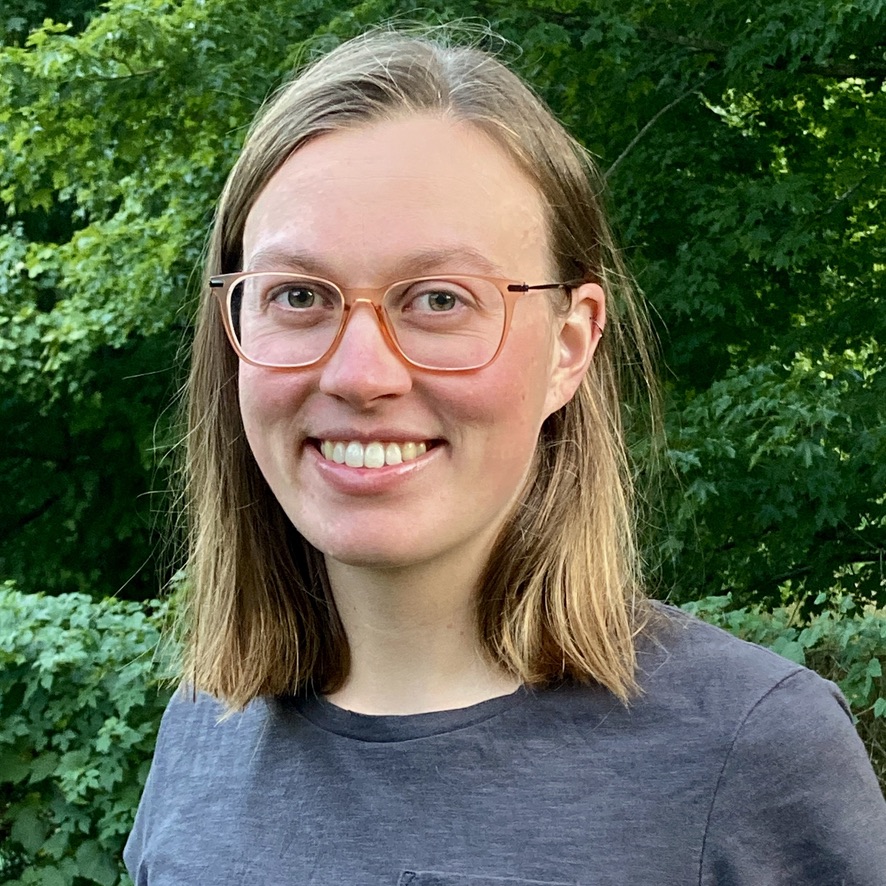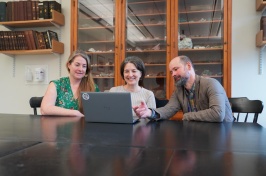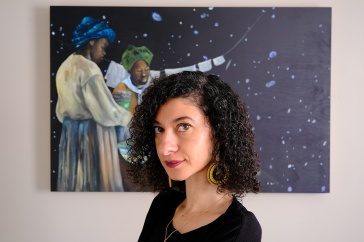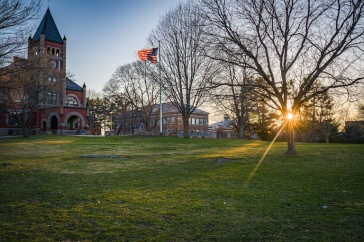Three UNH graduate students and two alumni received prestigious Graduate Research Fellowships (GRFP) from the National Science Foundation. Awarded to students pursuing master’s and doctoral degrees in science, technology, engineering and mathematics, the five-year fellowship includes three years of financial support, with an annual stipend and tuition allowance. Current student recipients are master’s students Alexis Eaton and Callyan Lacio and Ph.D. student Else Schlerman. Alumni recipients are Eli Duggan ’23, currently studying at the University of Strathclyde in Glasgow, Scotland; and UNH Manchester graduate Nicole Gallien ’22.

Alexis Eaton ’24 will be receiving her bachelor’s degree in environmental engineering and sustainability, and she will utilize her NSF GRFP to pursue a master’s degree at UNH in civil and environmental engineering next year. She plans to then continue her education in a Ph.D. program in environmental biochemistry or a similar field.
Eaton’s proposal centered around the presence of PFAS (per- and polyfluoroalkyl substances) in septic systems.
“PFAS are a group of manmade emerging contaminants that have been widely used in commercial products because of their resistance to heat, water and oil,” says Eaton. “These substances have been linked to various forms of cancer, reproductivity toxicity and poor thyroid function.”
Eaton’s research, mentored by professor of civil and environmental engineering Paula Mouser, has focused on the fate and transport of emerging contaminants. She says it is important to know where these chemicals end up in the environment, along with what types of substances they produce.
“Emerging contaminants are harmful to the environment and human health; we need to be able to determine what influences our exposure to these compounds and predict potential exposure pathways,” Eaton says.

Callyan Lacio, currently a first-year master’s student in the integrative biology program, is conducting acoustic research that monitors and studies animals' calls to estimate their population sizes and look at changes in breeding timing and behaviors. She also prioritizes integrating Indigenous knowledge and culture into her work.
Her advisor is assistant professor Laura Kloepper, who leads the Ecological Acoustics and Behavior Lab. She is also involved with the Center for Acoustics Research and Education at UNH’s Institute for the Study of Earth, Oceans and Space.
Lacio, who earned her bachelor’s degree in zoo science and conservation science at Friends University in Wichita, Kansas, uses passive acoustic monitoring, a technique Lacio says has lower impacts on the animals than normal monitoring efforts. She is also helping the Mashpee Wampanoag Nation create culture-to-career connection materials relating to STEM and her seal research in Cape Cod.
“The ‘culture-to-career’ connection focuses on taking what the Nation students are comfortable with, like their cultural stories and practices, and showing them how the knowledge and appreciation of their culture can be made into a career, for example culinary arts focusing on Indigenous foods or biology focusing on protecting Indigenous lands,” she says.
The GRFP will support Lacio’s move to UNH’s integrative biology Ph.D. program. Her goal is to work for a non-profit or foundation focused on helping animal populations that are locally at risk. As a Cherokee citizen, she also hopes to continue working with local Indigenous Nations and create culture-to-career connections for their students.

Else Schlerman wants to find ways that humans can live more harmoniously with the natural world, especially in face of climate change and large-scale habitat loss. As a doctoral student in the Natural Resources and Earth Systems Science Ph.D. program, her research focuses on soil’s potential to store carbon, which speaks to her broad interest in ecologically informed climate change solutions. She is working with professor Stuart Grandy and associate professor Jessica Ernakovich in UNH’s Center of Soil Biogeochemistry and Microbial Ecology.
“Soils are the largest terrestrial pool of carbon – greater than the vegetation and atmosphere stocks combined,” says Schlerman, who earned her bachelor’s degree in physics with a German minor from Wellesley College. “Ecosystem-based land management practices can improve the health of the soil and the environment while also removing carbon from the atmosphere. Through my research, I hope to develop the basic research on the mechanisms of soil carbon storage that can inform agricultural and ecological management strategies.”
After completing her doctorate, Schlerman plans to work as a scientist for an environmental conservation organization where she can apply the research she’s doing now to broader restoration and conservation efforts.
NSF awarded 500 fewer GRFP awards this year, making competition for the fellowship especially stiff, says Leigh Pratt, director of UNH’s Office of National Fellowships. Pratt and Michael Thompson, director of Research & Large Center Development, prepare UNH candidates for success as co-teachers of the UNH NSF GRFP class each fall (INCO 791 / GRAD 891). The course prepares eligible seniors and first- and second-year graduate students to submit applications to the program. Since UNH began offering the GRFP prep in 2019, 13 of 16 students who have been awarded the fellowship have taken the class.
-
Written By:
Sarah Schaier | College of Life Sciences and Agriculture -
Written By:
Hayley Barnhard '23 | For Communications and Public Affairs
-
Compiled By:
Beth Potier | UNH Marketing | beth.potier@unh.edu | 2-1566





















































